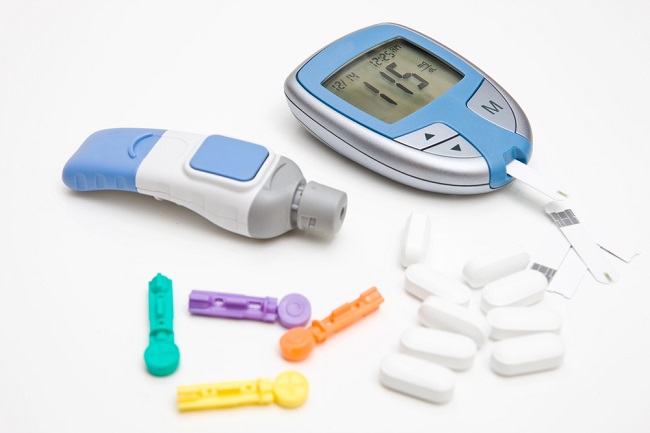Vinorelbine or vinorelbine tartrate is a drug used to treat certain types of cancer. This drug is used in chemotherapy procedures to treat cervical cancer, breast cancer, ovarian cancer, and other types of lung cancer non-small cell lung cancer (NSCLC).
Vinorelbine works by inhibiting the process of cell division, so that the growth of cancer cells in the body can be slowed or stopped. Vinorelbine is usually combined with other chemotherapy drugs.

vinorelbine trademark:Navelbine, Vinsoh, Vinorelsin, Vinorkal, Vinorelbine Tartrate
What is Vinorelbine
| group | Prescription drugs |
| Category | Chemotherapy or anticancer drugs |
| Benefit | Treating several types of cancer, such as cervical cancer, breast cancer, ovarian cancer, and lung cancer types non-small cell lung cancer (NSCLC) |
| Used by | Mature |
| Vinorelbine for pregnant and lactating women | Category D:There is positive evidence of risks to the human fetus, but the benefits may outweigh the risks, for example in dealing with life-threatening situations. It is not known whether vinorelbine is absorbed into breast milk or not. If you are breastfeeding, do not use this medicine without consulting your doctor first. |
| Drug form | Soft capsules and injections |
Precautions Before Using Vinorelbine
Vinorelbine must be used with a doctor's prescription. The following are a few things to consider before using vinorelbine:
- Tell your doctor about any allergies you have. Vinorelbine should not be used by patients who are allergic to this drug.
- Tell your doctor if you have or are currently suffering from liver disease, neurological disorders, heart disease, intestinal obstruction, tingling, or disease of the spinal cord that can cause anemia, leukopenia, or thrombocytopenia.
- Tell your doctor if you are pregnant, breastfeeding, or planning a pregnancy. Use birth control to prevent pregnancy while on treatment with vinorelbine.
- Tell your doctor if you have recently had radiation therapy or cancer treatment.
- Tell your doctor if you want to be immunized or vaccinated with a live vaccine, such as the typhoid vaccine, while taking vinorelbine. This is because these drugs can reduce the effectiveness of the vaccine.
- Do not drink alcohol, drive a vehicle or do activities that require alertness while you are taking vinorelbine, as this medicine can make you dizzy.
- Use sunscreen and limit activities that expose you to direct sunlight during treatment with vinorelbine, as this medication can make your skin more sensitive to sunlight and increase your risk of developing it. sunburn.
- Tell your doctor if you are taking any other medicines, including supplements, or herbal products.
- See your doctor right away if you experience an allergic drug reaction, serious side effect or overdose after using vinorelbine.
Vinorelbine Pakia Dosage and Rules
Vinorelbine will be given by a doctor, the dose will be determined based on the age, condition of the patient, and the body's response to the drug. In general, the following are the doses of vinorelbine for adults based on the dosage form of the drug, body surface area (LPT) and the patient's condition:
Intravenous (IV) injection form
- Condition: Cervical cancer
The dose is 30 mg/m2, on days 1 and 8 of a 21-day cycle.
- Condition: Breast cancer, ovarian cancer
The dose is 25 mg/m2, every 7 days.
- Condition: Lung cancer type non-small cell lung cancer (NSCLC)
The dose is 30 mg/m2, once a week given by infusion over 20–30 minutes when dissolved in 5% glucose solution. As combination therapy with cisplatin, the dose is 25–30 mg/m2, once a week
Soft capsule form
- Condition: Lung cancer type non-small cell lung cancer (NSCLC)
The dose is 60 mg/m2, once a week for 3 weeks. The dose can be increased to 80 mg/m2, once a week.
How to Use Vinorelbine Correctly
Injectable vinorelbine will be given in the hospital by a doctor or medical officer under the supervision of a doctor. Vinorelbine will be injected through a vein (IV/intravenous).
The doctor will inject vinorelbine according to the patient's condition. Follow the doctor's advice while undergoing treatment with vinorelbine.
For soft capsules of vinorelbine, follow the dosage prescribed by your doctor. Do not increase or decrease the dose without consulting your doctor first.
Take this medicine regularly according to the schedule given by your doctor. Swallow the medicine with the help of water. Swallow the medicine whole, do not chew or crush it.
If you forget to take vinorelbine, take it immediately if the break with the next consumption schedule is not too close. If it is close, ignore it and do not double the dose.
Be sure to check with your doctor regularly while taking vinorelbine so that your doctor can monitor the progress of the condition.
Store vinorelbine in a tightly closed container, at room temperature, and away from direct sunlight. Keep this medicine out of reach of children.
Vinorelbine Interactions with Other Drugs
The following are some of the effects of drug interactions that may occur if vinorelbine is taken at the same time as other drugs:
- Increased risk of granulocytopenia with cisplatin
- Increased risk of nerve cell damage when used with paclitaxel, itraconazole, or ketoconazole
- Increased risk of developing pulmonary disorders when used with mitomycin
- Increased risk of spinal cord damage when used with zidovudine
- Increased risk of side effects when used with troleandomycin, verapamil, erythromycin, or ritonavir
- Increased risk of developing infectious diseases and decreased effectiveness of live vaccines, such as the BCG vaccine, influenza vaccine, measles vaccine, or typhoid vaccine
Vinorelbine Side Effects and Dangers
Some of the side effects that may occur after using vinorelbine are:
- Nausea or vomiting
- Tired or dizzy
- Constipation or diarrhea
- Muscle pain or joint pain
- For injection preparations there may be irritation, pain, redness, or bruising at the injection site
- Hair loss
Check with your doctor if the side effects above do not subside. Immediately see a doctor if there is an allergic reaction to the drug which can be characterized by certain symptoms, such as the appearance of an itchy and swollen rash, swollen eyes and lips, or difficulty breathing.
In addition, you should also see a doctor immediately if you experience more serious side effects, such as:
- Shortness of breath, cough, or difficulty breathing
- Mood swings
- Severe constipation, stomach pain, or bloody stools
- Numbness, tingling, and muscle weakness
- Pain, redness, and peeling of the skin on the hands or feet
- Liver disorders, which are characterized by nausea, vomiting, loss of appetite, stomach pain, jaundice, or dark urine
- Leukopenia, which is characterized by fever, chills, mouth sores, easy bruising or bleeding, pale skin, cold hands and feet, or dizziness









